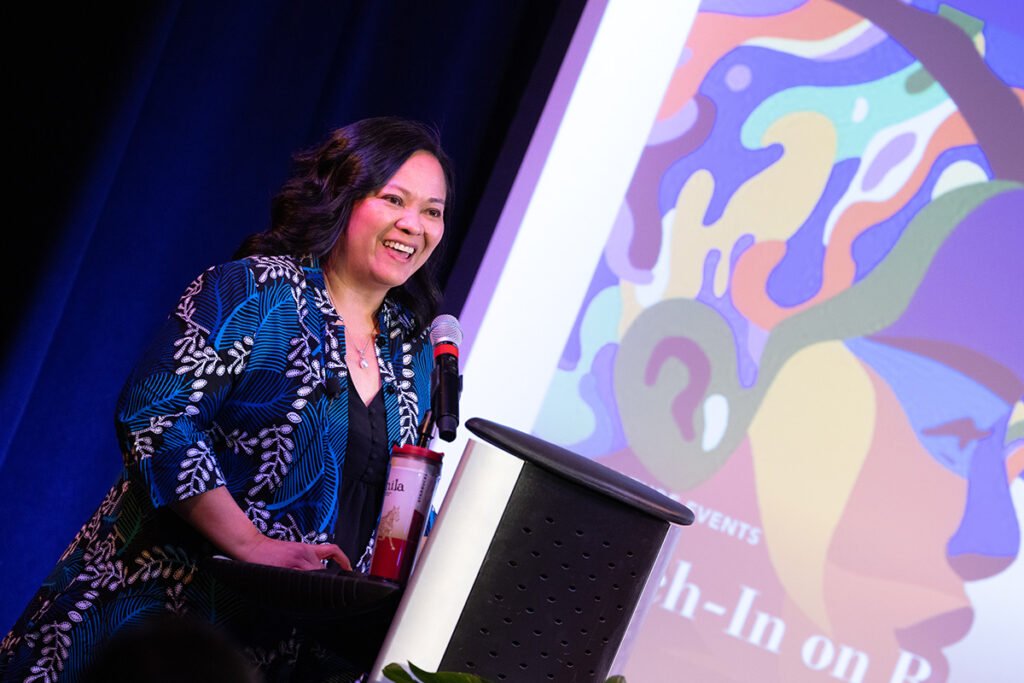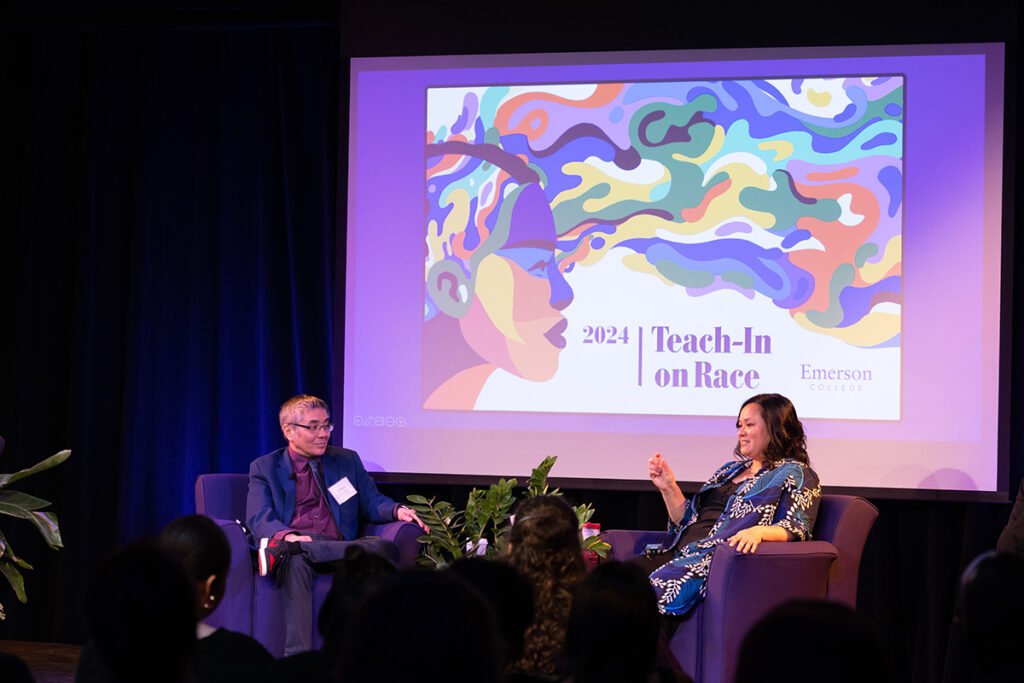Teach-In on Race: Grace Talusan on Finding Her Voice and Finding a Home

Writer and Brown University lecturer Grace Talusan thought at one point the Philippines might be home to her, then decided the United States was where she belonged.
But she has another home that transcends time and place, and comes with her wherever she travels.
“I still want to be here with you all — writing, teaching, participating in a literary community and a life centered around books and stories. And for me, this is a kind of home,” said Talusan, author of The Body Papers and keynote speaker for this year’s Teach-In on Race. “I’ve worked hard to counter messages that I internalized that made it nearly impossible for me to write and communicate.”
In a wide-ranging talk on this year’s Teach-In theme, “A ‘New Normal’ Just Won’t Do: Intersectionality in the Arts and Communication,” Talusan talked about how her identities — a Filipino woman, an immigrant, trauma survivor, and wife of an African American man — shape her art, her teaching, and her world. Talusan was introduced with remarks by Vice Provost for Internationalization & Equity Tony Pinder, Vice President for Equity & Social Justice Shaya Gregory Poku, and President Jay Bernhardt, as well as a musical performance by Sydney Rice ’24, Maddy Reyes ’24, and Sky Fortes ’25. Following her talk, she spoke with her friend, Writing, Literature and Publishing Chair Roy Kamada, and took questions from the audience.
Using examples and photos from her own life, Talusan introduced the audience at The Judee and online to her great-grandfather, Capt. Pedro Navarro, who traveled to the U.S. from the Philippines in 1904 as part of an exhibition at the St. Louis World’s Fair. She talked about her mother-in-law, a Black single mother in Louisville, Kentucky, who cared for her children and parents on a shoestring, then joined a class action lawsuit when she learned that she and her fellow Black BellSouth employees had been categorically underpaid.
And she explained how it took her years to understand that her categorization as a “model minority,” was really a construct used as a scaffolding for white supremacy.

“If we think that there’s a ‘model minority,’ well then who is constructed as the ‘problem minority’?” she asked. “It took me a long time to understand how I was being used in that instance as a wedge, as a way to … keep me apart from other people who struggled with very similar oppressions. So I began to think about and ask, ‘Who in what systems benefit from this divisiveness?’”
Talusan read excerpts from her essay, “The Haunted,” published in The Seventh Wave last December, about the ways she, as an Asian woman, and her husband, a Black man, experience the world — where the intersect and where they can never meet.
“Alonso’s presence as a Black man changes any space he steps into. If he has spent his life being haunted by racist ideas and expectations, he has also simultaneously embodied the apparition. He’s told me how much he notices, even if he pretends not to see, it does not benefit him to openly react to white people’s reactions to him. … Even with my spot in the passenger seat of anti-Black racism, there is a distance I can’t bridge. I can shake my head and tell him ‘I’m sorry,’ and ‘What do you need?’ But this is practically nothing against the constant and mundane humiliations, the danger of his very existence.”
Describing herself as “a person who is familiar with experiences of dehumanization in various ways … a person who’s almost lost everything,” Talusan said she has had to learn to fight against her indoctrination to suffer silently and not speak up — an act that for her, means writing.
“This is work that is my attempt to reclaim power through narrative, and to also, as a teacher, encourage others who’ve been marginalized to use their voice in the ways they can. And this happens when we pay attention, when we read closely and think critically, when we ask questions, when we express the truth. These are practices that can promote and uphold democracy, liberating people from oppression, which is why these are also dangerous activities,” she said.

During the talk, and in conversation with Kamada and audience members, Talusan left the audience with some advice:
On writing difficult topics:
Sometimes I would cry as I was writing. It was very painful to be in those moments, but I told myself, OK, if you just get to the end of this paragraph, you can go get a lavender biscuit from that bakery down the street… Find out who you are. What do you need to make your work? My hope as a teacher and a writer is that people continue to make work as long as they want. And so how can you support that in yourself?”
On small actions:
“It’s called being undocumented, but there is documentation saying that they were going to deport us. It was an … act of administrative kindness that someone underlined the word, ‘8-year-old girl’ a lot in my paperwork and I’m here. They didn’t come for us. … So perhaps that administrator who underlined ‘8-year-old girl’ was this kind of resistance, like a small act of resistance against that term, ‘deportable alien’ in that same document…. We think, ‘oh, we’re so powerless, we can’t do much.’ No. I don’t know who that person is, they redacted their name, but that person changed my life.”
On making room for joy:
“Writing doesn’t always have to be this serious, painful … there’s a cliché about ‘open up a vein and bleed,’ right? No, it can actually be joyful. You can live your life twice, even the fun parts. I want to start with [my students] there so that they have positive experiences, and then we build from there in terms of building safety, building community with each other, with me and with themselves, and then they should go where they want to go as writers.”
On the power of nonfiction writing:
I do think that through practice, and in community and encouragement, we can start to get our voice back. And that written voice — nonfiction especially — it’s so powerful. You can do so many things with it: You can apply for grants, you can complain, you can write a policy or law, you can write an essay, but you can do a lot with that voice. I feel like it’s a mission for me to help people strengthen that, no matter what sort of positive change they want to make.”
Categories